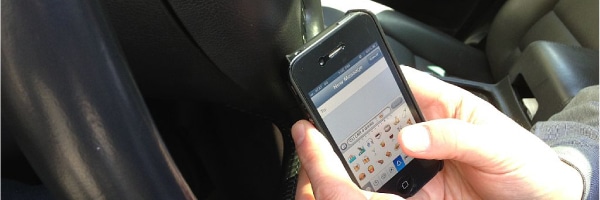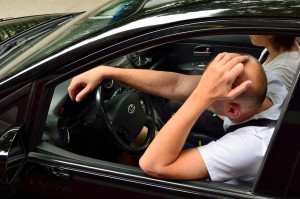
As we are inundated with countless distractions from our increasingly hectic daily lives, it can be easy to let the little things interfere with our safe driving habits. Whether the blame is put on technology, other drivers, or our own wandering minds, letting ourselves get distracted behind the wheel can have devastating consequences. To prevent unnecessary accidents and to avoid injuries, drivers can be mindful of the following tips when on the road:
Turn off your phone. Remove any temptation to answer a call, respond to a text, or send out an email by simply turning off your phone while driving. However important the message or call might be, it is worth delaying a response by a few minutes rather than causing irreversible damage. Some phones even have silent settings that can be activated before driving.

Organize ahead of time so you aren’t multitasking on the road. Most of us prefer to jump in the car to get ahead of traffic rather than planning out our trip, but taking those few moments to plan ahead will give you the peace of mind as to where you are going and how you’ll get there. It helps to remember that navigation systems aren’t flawless, so it can help to plan out your trip in advance with alternate routes to avoid using your GPS en route. This includes allocating enough time to eat, drink (non-alcoholic beverages, of course), and smoke/vape (tobacco, obviously) before getting in the car as to avoid eating, drinking, or smoking while driving. Besides, you won’t enjoy these things as much as you would with enough time and free hands to eat, drink, or smoke.

Don’t listen to any podcasts or music that evoke emotional reactions. Passengers aren’t the sole source for evoking emotional responses. Even though we all have a guilty pleasure song we love singing along to or a favourite podcast we listen intently to, letting our emotions run away from us can result in daydreaming or reacting irrationally to otherwise routine occurrences. This tip carries over to being mindful of how you’re feeling before you get behind the wheel. If you’ve just gotten into an argument, received unfortunate news, or are heading to an unpleasant destination like the hospital, court, or dreaded meeting with your boss, take a breath before letting your emotions drive you into a dangerous situation. As upsetting as your day might be, it will unfortunately still be waiting for you; adding an injury or collision to your list of problems won’t help anything.
Pulling over only takes a few moments you can spare. If you want to enjoy the view, locate a designated observation area and enjoy from the side of the road. Also, if you drop or need to find something, find a safe shoulder and always put on your hazard lights to indicate your presence to other drivers. In the end, admiring an inspirational landscape and not scraping your hand under your seat are two benefits of pulling over to a safe spot.
Tired driving is impaired driving. From long, all-day road trips to the short commute home from work, sleep deprivation can be just as dangerous as being intoxicated. Delaying response times, stunted focus, and disregard for your surroundings are consequences of tired driving. If you feel yourself starting to nod off of your eyes are feeling heavy, don’t push on, just pull over and rest.

Keep control of your emotions. Try not to succumb to road rage. We get it- you know what you’re doing on the road and everyone else evidently doesn’t. It’s not personal; some people just aren’t as courteous as you are, so ease your mind knowing that you are in fact the superior driver and don’t take it upon yourself to “educate” those who aren’t as experienced behind the wheel as you are. If that doesn’t appeal to you, just remember that we all have unique lives that sometimes result in absent-mindedness – so if you can’t ignore, try to forgive.
Be mindful of all forms of impaired driving. This tip may seem like common sense to most of us, but there is still a select few who overestimate their impaired driving abilities or underestimate how much alcohol or cannabis they have consumed. To avoid getting carried away and losing track of your level of indulgence, the safest – not to mention easiest – way to avoid a lethal underestimation is to abstain until you get home or have a designated driver to take on the responsibility of driving. Also, it is sometimes easy to forget the effect that prescription medications have on our ability to drive safely, so if you have been prescribed a medication, it is always best practice to speak with your doctor to see if there is an associated risk of being unable to operate a vehicle.
Granted, most of these tips are easier said than done. If you take the little extra bit of effort and time to properly prepare for your trip, short or long distance, it can help make your time behind the wheel a more enjoyable experience.





